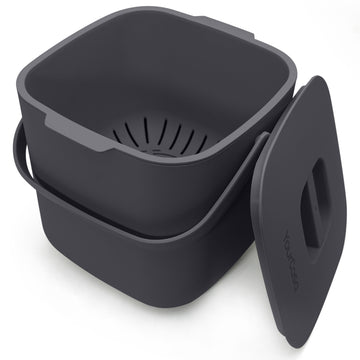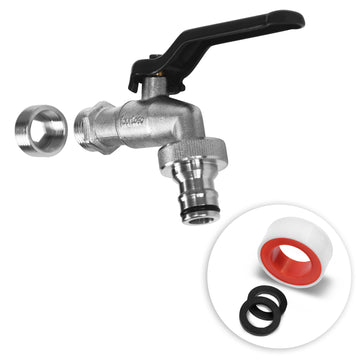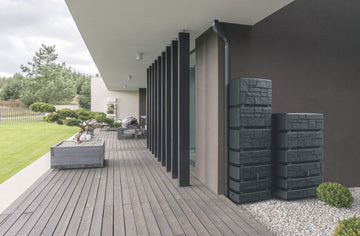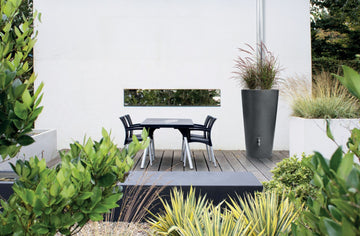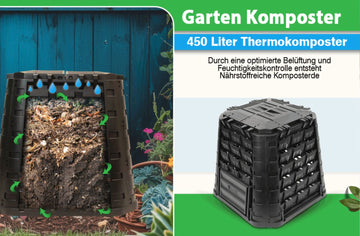
You do n't want to just throw away your kitchen and garden waste , for the sake of the environment or for practical reasons? Then composting is the way to go - because it is probably the most effective way to put such waste to good use and convert it into nutrient-rich fertilizer. And not only that: on top of that, it reduces the amount of waste that ends up in landfills and at the same time helps to enrich the soil in your garden.
YourCasa supports you with a large selection of premium garden and kitchen accessories . Our high-quality compost bins and corresponding spare parts are not only functional, but also stylishly designed. So: Even if the best time to start composting is actually spring, you should start collecting suitable waste now - because nature offers organic waste that you can use at any time of year.
When is the best time to start composting? The best time to start composting is spring. At this time of year, nature awakens and there is plenty of fresh organic material such as fallen leaves and garden waste that you can easily collect and use. The warmer soil also promotes faster decomposition of the materials. But you can also start at other times of the year - especially in autumn, when there are a lot of leaves and plant residues. Above all, it is important to compost regularly in order to continuously produce high-quality fertilizer for your plants.
Why should you start composting?
There are many good reasons to start composting . Not only is it good for the environment, but it's also a great way to reduce the amount of household waste.
When you turn your kitchen and garden waste into compost, you not only reduce the amount of garbage that ends up as landfill waste, but you also get a good amount of valuable fertilizer for your garden . Compost significantly improves soil quality by loosening the soil structure. This in turn improves water retention and aeration. The result: healthy root growth and increased resistance of your plants to diseases and pests.
Compost also helps reduce the need for chemical fertilizers because it is rich in beneficial microorganisms and nutrients that naturally support plant growth. Chemical fertilizers are generally not particularly environmentally friendly to produce - so you are also helping to protect our planet in this respect.
In summary, the list of benefits of composting your waste is as follows:
- Reduces household waste and avoids landfilling
- Improves soil quality through loosening and better water retention
- Promotes healthy plant growth and increases resistance to diseases
- Reduces the need for chemical fertilizers through natural nutrient supply
What time of year is best to start a compost pile?
If you ask experts when the best time to start a compost pile is, they'll most likely tell you spring - and they'd be right. Spring is perfect because the higher temperatures and relatively humid weather encourage faster decomposition of organic materials . In summer, decomposition is fast, but high temperatures can lead to dryness, which slows the process. Fall offers plenty of material such as leaves, but the subsequent cold in winter can significantly slow the composting process.
In the following table we have clearly summarized the respective advantages and disadvantages as well as things that you have to consider in each season:
| season | Advantages | Disadvantages | Please note |
| Spring | High temperatures, rapid decomposition | Competition from gardening | Keep sufficiently moist |
| Summer | Fastest decomposition | Dryness can slow down the process | Water sufficiently |
| Autumn | Lots of material due to leaf fall | Cold can slow down the process | Cover well before winter |
| winter | Less other gardening | Very slow decomposition | Good insulation of the compost |

Which composter products does YourCasa offer for small spaces?
Since not everyone has a large garden or the necessary space, YourCasa also offers composters that can be used in small spaces . These compact solutions make it possible to recycle and live in an environmentally conscious way, even indoors or on the balcony.
In the following table we present some of these products:
| product | Type of composter | Capacity | Special features | Price (€) |
| YourCasa® Organic Waste Bin Kitchen 4L – Dishwasher safe & odor-proof | Kitchen composter | 4 liters | Dishwasher safe; waterproof | 23,99 |
| YourCasa® compost bin - 7L – for everyday organic waste in the kitchen | Kitchen composter | 7 liters | Dishwasher safe; odor-proof | 28.99 |
| YourCasa® compost bin – organic waste bin kitchen – sustainable organic waste bin | Kitchen composter | 4 liters / 6 liters | Sustainable; odor-proof | 34,99 |
| YourCasa® organic waste bin kitchen - 6L with lid and wall mount | Kitchen composter | 6 liters | Lid; wall hanging | 14,99 |
| YourCasa® 7L organic waste bin with holder and sieve for kitchen – odor-proof & dishwasher-safe | Kitchen composter | 7 liters | Odour-proof; dishwasher-safe; with holder; with sieve | 27,99 |
How do you start composting effectively in a small space?
As soon as you have decided on one of the many composters from YourCasa, it's time to get down to business. To help you get started with composting right away, we have put together a short step-by-step guide for you:
- Choose the right compost bin: Bokashi buckets or closed composters like the kitchen composters from YourCasa are particularly suitable for small spaces, as they minimize odors and save space.
- Determine location: Place the composter in a location that is easily accessible, but make sure it is not in direct sunlight or in an extremely cold location.
- Prepare materials: Collect compostable kitchen waste such as vegetable scraps, fruit peels, coffee grounds and eggshells in a kitchen composter. Avoid meat, fish and dairy products as these can create bad smells and attract pests.
- Create layers: Start with a layer of coarse material such as small twigs or crumpled paper to allow for ventilation. Then add alternating layers of wet and dry materials.
- Maintain regularly: Mix the contents of the composter regularly to ensure good aeration and speed up the decomposition process.
- Harvest the compost: Once the contents are evenly dark and crumbly, you can use it as fertilizer.

What common mistakes should be avoided when composting?
Every beginning brings challenges - and this also applies to composting. That's why it's no shame that many people who are just getting started with composting still make beginner mistakes. To prevent this from happening to you, we'll explain some of the most common mistakes .
First of all, you should know that composting is divided into "green" materials, such as kitchen scraps, and "brown" materials, such as dry leaves or paper. Many beginners make the mistake of mixing these materials indiscriminately. However, a balanced ratio is crucial , as it allows for optimal decomposition and prevents bad smells. Too many green materials often lead to a mushy, smelly pile, while too many brown materials slow down the composting process.
Speaking of bad smells, you certainly don't want your compost to smell bad and disturb the neighbors. To minimize odors, it is important to mix the compost regularly . This ensures adequate ventilation and helps the microbes in the pile to decompose the waste effectively. To keep pests away, the compost bin should be tightly closed. Also, you should never add meat, fish or dairy products - these can attract pests.
If you pay attention to these points, you will avoid the crucial mistakes.
conclusion
Everyone who has their own garden should compost. This not only benefits you as a proud garden owner, as it ensures that the plants in your garden grow and thrive like never before thanks to the many nutrients in the compost , but also the environment. Less rubbish in the bin , less landfill waste, less chemical fertilizers, more awareness - composting has many positive side effects.
YourCasa will help you get started right away. If you have little space, you should definitely take a look at our kitchen composters. If, on the other hand, you have a large garden that will produce a lot of compost over time, the EcoFusion could be just the right composter for you - because this large garden composter holds up to 450 liters and can therefore supply even larger areas with nutrient-rich fertilizer.

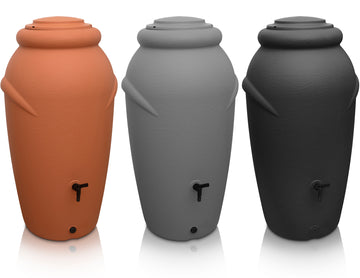
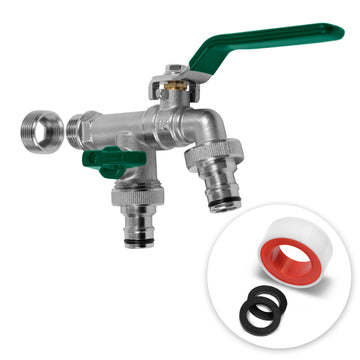
![Drei hohe YourCasa Regentonne 240 Liter [Wellen-Design] - Frostsicher & UV-beständige Gartentöpfe in den Farben Schwarz, Grau und Terrakotta, jeweils mit Drainagesystem für nachhaltige Bewässerung.](http://yourcasa.de/cdn/shop/files/ohnelogo_b8aeecac-557e-4106-a999-e77dcd160209.jpg?v=1707130230&width=360)
